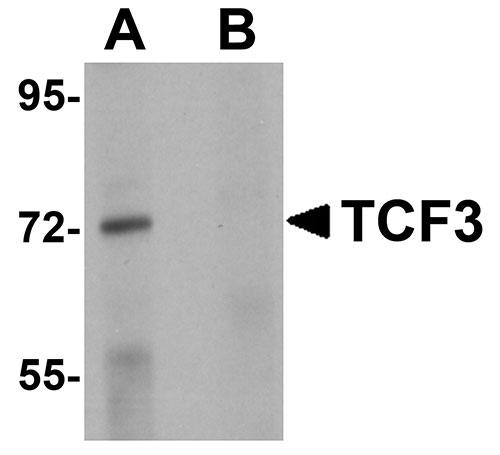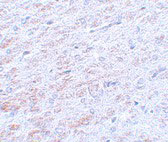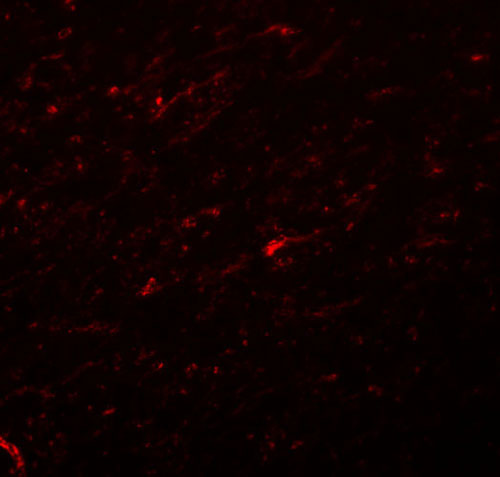TCF3 Antibody
- 产品详情
- 实验流程
- 背景知识
Application
| WB, IF, E, IHC-P |
|---|---|
| Primary Accession | P15923 |
| Other Accession | NP_003191, 27777636 |
| Reactivity | Human, Mouse, Rat |
| Host | Rabbit |
| Clonality | Polyclonal |
| Isotype | IgG |
| Calculated MW | 67600 Da |
| Concentration (mg/ml) | 1 mg/mL |
| Conjugate | Unconjugated |
| Application Notes | TCF3 antibody can be used for detection of TCF3 by Western blot at 1 µg/mL. Antibody can also be used for immunohistochemistry starting at 5 µg/mL. For immunofluorescence start at 20 µg/mL. |
| Gene ID | 6929 |
|---|---|
| Other Names | Transcription factor E2-alpha, Class B basic helix-loop-helix protein 21, bHLHb21, Immunoglobulin enhancer-binding factor E12/E47, Immunoglobulin transcription factor 1, Kappa-E2-binding factor, Transcription factor 3, TCF-3, Transcription factor ITF-1, TCF3, BHLHB21, E2A, ITF1 |
| Target/Specificity | TCF3; |
| Reconstitution & Storage | TCF3 antibody can be stored at 4℃ for three months and -20℃, stable for up to one year. As with all antibodies care should be taken to avoid repeated freeze thaw cycles. Antibodies should not be exposed to prolonged high temperatures. |
| Precautions | TCF3 Antibody is for research use only and not for use in diagnostic or therapeutic procedures. |
| Name | TCF3 |
|---|---|
| Synonyms | BHLHB21, E2A, ITF1 |
| Function | Transcriptional regulator involved in the initiation of neuronal differentiation and mesenchymal to epithelial transition (By similarity). Heterodimers between TCF3 and tissue-specific basic helix- loop-helix (bHLH) proteins play major roles in determining tissue- specific cell fate during embryogenesis, like muscle or early B-cell differentiation (By similarity). Together with TCF15, required for the mesenchymal to epithelial transition (By similarity). Dimers bind DNA on E-box motifs: 5'-CANNTG-3' (By similarity). Binds to the kappa-E2 site in the kappa immunoglobulin gene enhancer (PubMed:2493990). Binds to IEB1 and IEB2, which are short DNA sequences in the insulin gene transcription control region (By similarity). |
| Cellular Location | Nucleus. |
For Research Use Only. Not For Use In Diagnostic Procedures.
Provided below are standard protocols that you may find useful for product applications.
BACKGROUND
TCF3 Antibody: The TCF3 gene, also called E2A, encodes two basic helix-loop-helix (bHLH) transcription factors, E12 and E47, through alternative splicing. These transcription factors are involved in mediating canonical Wnt signaling, which is very important in a diverse array of cellular functions such as stem cell proliferation, self-renewal, activation, fate determination, differentiation and aging and senescence. They bind beta-catenin and can act as transcriptional activators or repressors for Wnt target genes, and have been shown to regulate specific target genes during CNS development downstream of Wnt signaling. TCF3/Lef complexes are also known to play key roles in controlling cell fate lineages in multipotent skin stem cells.
REFERENCES
Korinek V, Barker N, Willert K, et al. Two members of the Tcf family implicated in Wnt/beta-catenin signaling during embryogenesis in the mouse. Mol. Cell Biol.1998; 18:1248-1256.
Gribble SL, Kim HS, Bonner J, et al. Tcf3 inhibits spinal cord neurogenesis by regulating sox4a expression. Dev. Cell2009; 136:781-9.
Cole MF, Johnstone SE, Newman JJ, et al. Tcf3 is an integral component of the core regulatory circuitry of embryonic stem cells. Genes Dev.2008;22:746-55.
Nguyen H, Rendl M and Fuchs E. Tcf3 governs stem cell features and represses cell fate determination in skin. Cell2006; 127:171-83.
终于等到您。ABCEPTA(百远生物)抗体产品。
点击下方“我要评价 ”按钮提交您的反馈信息,您的反馈和评价是我们最宝贵的财富之一,
我们将在1-3个工作日内处理您的反馈信息。
如有疑问,联系:0512-88856768 tech-china@abcepta.com.























 癌症的基本特征包括细胞增殖、血管生成、迁移、凋亡逃避机制和细胞永生等。找到癌症发生过程中这些通路的关键标记物和对应的抗体用于检测至关重要。
癌症的基本特征包括细胞增殖、血管生成、迁移、凋亡逃避机制和细胞永生等。找到癌症发生过程中这些通路的关键标记物和对应的抗体用于检测至关重要。 为您推荐一个泛素化位点预测神器——泛素化分析工具,可以为您的蛋白的泛素化位点作出预测和评分。
为您推荐一个泛素化位点预测神器——泛素化分析工具,可以为您的蛋白的泛素化位点作出预测和评分。 细胞自噬受体图形绘图工具为你的蛋白的细胞受体结合位点作出预测和评分,识别结合到自噬通路中的蛋白是非常重要的,便于让我们理解自噬在正常生理、病理过程中的作用,如发育、细胞分化、神经退化性疾病、压力条件下、感染和癌症。
细胞自噬受体图形绘图工具为你的蛋白的细胞受体结合位点作出预测和评分,识别结合到自噬通路中的蛋白是非常重要的,便于让我们理解自噬在正常生理、病理过程中的作用,如发育、细胞分化、神经退化性疾病、压力条件下、感染和癌症。








